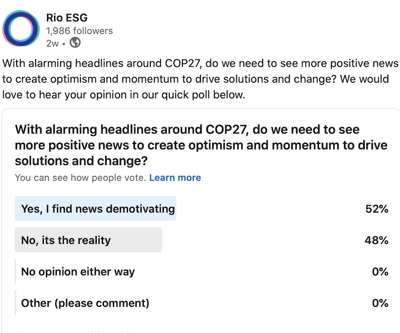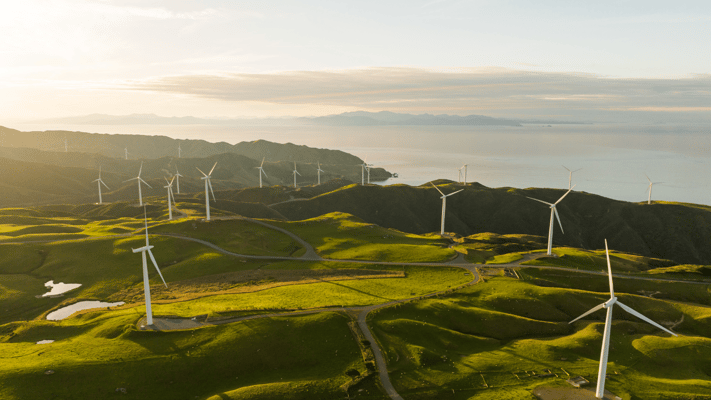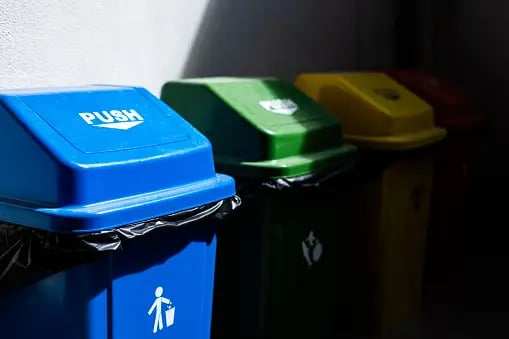 We recently did a poll on whether we need to see more positive news to create optimism and momentum to drive solutions and change or if we need to be confronted with the stark reality of climate change, with a clear split in the results.
We recently did a poll on whether we need to see more positive news to create optimism and momentum to drive solutions and change or if we need to be confronted with the stark reality of climate change, with a clear split in the results.
Whether you view the daily climate news as a stark and vital reflection of reality or approach it with a sense of eco-anxiety or climate doom, we can’t deflect from the fact that there is a lot to be worried about when it comes to the climate and nature crises.
However, when does the news cross from imbedding a sense of urgency, to a sense of hopelessness and apathy. The media has a huge part to play in combatting climate doom. It remains a journalist's job to report accurately and not downplay the severity of the situation or greenwash reality. But is it the job of the media to showcase incredible climate solutions and instigate hope?
Publications such as Positive News are gaining momentum as the first media organisation in the world that is dedicated to ‘constructive journalism’ – a new approach in the media, which is about rigorous and relevant journalism that is focused on progress, possibility, and solutions.
In line with this, we thought we would share some positive news that has caught our eye over the past few weeks and, whilst we still have a vastly long way to go to combat climate change, it is worth highlighting progress and those tackling it head-on.
Brazil's new president Luiz Inácio Lula da Silva has pledged to end deforestation in Amazon after beating right-wing incumbent Jair Bolsonaro in the country's election.
Lula’s victory could cut deforestation in the Amazon by 89 per cent over the next decade, according to an analysis carried out by Carbon Brief.
European Union negotiators have struck a deal for binding emissions reduction targets for sectors including road transport, agriculture, buildings, and waste. These stricter targets increase the emissions reduction each nation is committed to in the coming years.
Climate change is exacerbating the loss of arable land - but Indian farmers are fighting this process of desertification with natural techniques.
"This soil used to be as hard as a brick," said 37-year-old farmer Ramesh. "It's now like a sponge. The soil is rich with the nutrients and life."
The black-naped pheasant pigeon was last spotted 140 years ago. Despite occasional sightings by hunters, there were fears that the animal had gone extinct.
But new footage captured by scientists in Papua New Guinea in September revealed that the pigeon lives on. The new discovery was like ‘‘finding a unicorn," expedition co-leader John Mittermeier says.
“It is the kind of moment you dream about your entire life as a conservationist and birdwatcher,” he says.
All large car parks in France will be covered by solar panels under new legislation approved as part of president Emmanuel Macron’s renewable energy drive.
Legislation approved by the French Senate this week requires existing and new car parks with space for at least 80 vehicles to be covered by solar panels.
The owners of car parks with between 80 and 400 spaces have five years to comply with the measures, while operators of those with more than 400 will have just three years. At least half of the area of the larger sites must be covered by solar panels.
The French government believes the measure could generate up to 11 gigawatts of power.
Negative news reporting is necessary. It is necessary to bring awareness to climate change and to create the motivation and will to have it addressed. But is there room to establish a balance between daily solutions and progress and instilling the need to do better?
Where can businesses start?
With the increasing demand for carbon data, many teams are searching for a simple, intelligent solution for carbon footprinting that reduces manual effort and increases accuracy.
As a central hub for all your sustainability data, Rio is able to automate carbon reporting activities and help organisations improve efficiency on their path toward net zero.
Upload data from sources of your choice and Rio automatically calculates your organisation or portfolio’s carbon footprint using industry-standard guidance and conversion rates.
Rio allows you to compare performance across years or locations, set custom targets for reducing your footprint, and track performance against targets over time.
Want to learn more about how to reach Net Zero targets. Download our free guide here.








